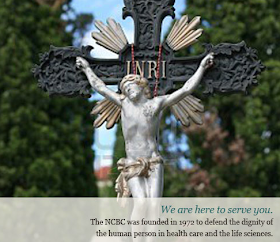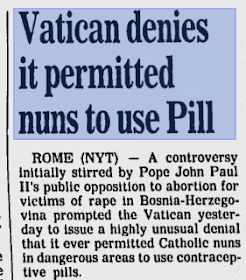 |
| Is rape an exception? |
Now that I've got your attention, here's another long essay. (And you thought you would be free of this after you graduated.)
Don't worry. I'll get back to Islam soon enough. But this issue niggles.
By the way, I welcome arguments for the opposite point of view. Just because you disagree with me doesn't mean you're a heretic.
Necessarily . . .
*****
Catholic moral theory prohibits contraception on the grounds that it is intrinsically evil. Recently, however, there has been talk of possible exceptions or special cases where the use of contraceptives may be licit. Pope Francis himself suggested that married couples might allowably use contraceptives to prevent conceiving a child with birth defects caused by the Zika virus.
I think it's safe to say that Catholic ethicists have generally rejected the Pope's reasoning, with the exception of dissident ethicists who were pro-contraception to begin with. (What this says about the state of the Church and the current papacy, I'll leave for another time.) Among other things, the 1968 encyclical Humanae vitae was quite clear in rejecting the use of contraceptives by married couples for any reason.
However, another sort of exceptional case is currently being discussed--the use of contraceptives to prevent conception in the case of rape. Ironically, the discussion was prompted by the Pope, in support of his Zika claim, citing an alleged historical example that has now almost certainly been debunked as a myth--the story of the Belgian Congo nuns who were "on the pill."
I have written elsewhere that this story is not only false but maliciously false--even obscene. And indeed it was denied by the Vatican when it last publicly surfaced in 1993. This hasn't stopped some Catholic commentators from continuing to use it as a moral thought experiment: True or not (they have argued), it shows that there are some cases--rape being one of them--where use of contraceptives might be licit.
But independent of relying on a bizarre and grotesque moral hypothetical, these commentators appear to have another thing going for them: For at least the last fifteen years the United States Conference of Catholic Bishops (USCCB) has apparently endorsed the use of the Morning After Pill for rape victims. This quasi-official instruction is contained in the Ethical and Religious Directives for Catholic Health Care Services (no. 36).
A woman who has been raped may defend herself against a conception resulting from sexual assault. If, after appropriate testing, there is no evidence that conception has occurred already, she may be treated with medication that would prevent ovulation, sperm capacitation, or fertilization. It is not permissible, however, to initiate or to recommend treatments that have as their purpose or direct effect the removal, destruction, or interference with the implantation of a fertilized ovum.It is important to note that the USCCB prohibits the use of anything that might be or function as an abortifacient. Many Catholic ethicists have claimed that the medical evidence now shows that there are no post-coitius contraceptives that meet this standard, and thus the 2001 USCCB directives implicitly get the science wrong.
This is obviously a very important debate but I want to leave it here for now. Rather, I want to assume with the USCCB that some of the contraceptives in question are merely contraceptive in nature, that is, they merely block or prevent fertilization. In that case, would it be licit to take them in the case of rape? Or to put it negatively, if contraception is intrinsically evil as the Catholic church has always taught, how could it be allowable in this case?
I think the answer is that the USCCB is incorrect--contraception is not allowable, even in cases of rape. But I want to consider the argument for the contrary position. Where does it go wrong?
In certain recent articles and discussions, one claim has been that we simply know it is licit. Why? Because the USCCB has told us so. This assertion, I suppose, has the added bonus of introducing a new definition of infallibility to the Magisterium. If a bishops conference pronounces on a philosophical claim on page 211 of an instruction manual for doctors, we know it to be true.
In fairness, there is also an actual argument that some Catholic theologians have set out.
Warning: the following discussion may get slightly gross.
The argument makes use of the doctrine of double effect: While blocking conception is an intrinsically bad result, we may intend a good result that merely has the blocking of conception as a foreseen though unintended result. A woman may obviously resist a rape, which of course may have the consequence of blocking conception. Thus, in the same way (so goes the argument), the use of contraception after penetration has occurred--i.e. the next morning--may be properly thought of as resistance to the rape. Blocking the sperm, or preventing it from fertilizing the ovum is no more morally problematic than attempting to physically throw off an attacker. The intention is not to contracept but to defend oneself against a rape.
But this misunderstands the doctrine of double effect. We may not do an intrinsically bad thing if that thing, even if not intended per se, is being used as a necessary means to achieve another albeit possibly good end. Blocking conception after a rape, while the general intention might be good--to avoid having a child (in and of itself a perfectly allowable intention)--includes the blocking of conception as a necessary means. What else would the purpose of taking a contraceptive pill be but that?
Against this it is claimed that what is occurring is self-defense against the rape, not the blocking of conception per se. There is no principled difference (again, so goes the argument) between attempting to block the penetration of the rapist and attempting to block (say) the continued progress of his sperm.
I still find this argument bizarre. Among other things it is an abuse of the English language. It doesn't diminish the horrible crime of rape in the least to say that rape, like most human actions, is implicitly defined as having a beginning point and an end point--that end point being no later then when the attacker leaves the scene. One doesn't go to the police or to a clinic the next day and say, "I am currently being raped even as we speak." And again, this is not to devalue the awful potential consequences of rape--physical or mental--which may unfortunately last a lifetime. But these are consequences, not the ongoing continuance of the rape itself.
The linguistic contortions necessary for the argument can be shown by this passage from a published Catholic theologian (much published, according to his website):
Similarly, after a rape is completed, if a women enters a hospital emergency room and is given a non-abortifacient spermicide, this medical intervention has the moral object of interrupting the rape.Did you get that? After a rape is completed, one may interrupt the rape. Or at least one may have "the moral object" of interrupting the rape. That makes no sense.
One could grossly say, I suppose, that the rape ends when the sperm reaches something, or fails to reach something. But this is also not how we use the word. Rape is not defined as a forcible attempt to fertilize an ovum. Among other things, men can rape other men, men can rape woman in ways that cannot possibly lead to conception and so on.
This bizarre stretching of the definition is an attempt to get around the fact that contraception is intrinsically evil. The only way to do that is to somehow redefine contraception as something else.
But answers to moral questions can never be about mere definitions of words. So, for the sake of argument, let's imagine that rape does continue way past the duration normally thought. As that sperm is attempting succeed in fertilization, hours after the initial act, the rape is continuing to occur. When does it end? It is possible, of course, that fertilization will occur and a baby will start to grow. That baby was not intended by the victim, nor is it morally required that she desire to have that baby. If we define a swimming sperm as the continuance of an attack, why not define a growing baby in the same way?
Or to look at it another way, suppose the baby were not a person but merely a tumor, starting to grow malignly. Surely in that case resisting that could justly be looked on as self-defense, made manifest as a result of the rape, whether we wish to say that the victim was still being raped or not.
Of course, I'm not suggesting that resisting that baby would be justified, nor does the USCCB suggest that. Indeed, it explicitly condemns abortion even after rape. The reason it condemns it is the correct one--that killing the baby, even as merely a means to achieving a permissible end (not wanting to have a child that one had no part in consenting to) is intrinsically evil.
So, there it is. Intrinsically evil. We can redefine rape as lasting nine months. We can call abortion after rape "self-defense" (and it perhaps would be self-defense, just not justified self-defense). But because killing the innocent baby would be intrinsically evil we cannot do it.
But for some reason the USCCB refuses to apply this logic to contraception.
Abortion and contraception are both intrinsically evil. If you want to say that one is more evil than the other (as virtually everyone would), that's fine. But they are both on precisely the same grounds when it comes to functioning as absolute side-constraints to our actions. We cannot intend to do them, either as ends themselves or as necessary means to achieve other ends, even if those ends are good ones.
Redefining words or concepts--rape as a two-day process--is one way to cheat this logic, but as I have tried to show, even that fails.
Why is all this important? The question of contraception after rape is not just a remote sort of case. If one adds "date rape" into the mix, this sort of issue is no doubt dealt with virtually every day. Though actual rape is horrific and it may seem unfeeling to ask a rape victim to refrain from doing anything that she believes will help her, it is still wrong to compound things by introducing further evil into the situation.
Equally importantly, the history of ethics in general and Christian and Catholic ethics in particular, show that these sorts of moral "exceptions" have the tendency to eventually undermine the entire moral structure. That's certainly why some defend and advance them. They hate the Church's teachings on sexual morality but they know they cannot, at least at the moment, attack those teachings directly. So they float these sorts of arguments.
Others are perfectly faithful and sincere and have merely been convinced on the not completely unreasonable grounds that important Catholic people or groups such as the USCCB have endorsed them. And of course, some faithful Catholics are convinced by their own sincerely made arguments. Their arguments are nevertheless unsound. That's not a criticism per se. It happens.
But it's still dangerous.
The Belgian Congo nun case was a thought experiment floated by three Catholic theologians sixty-five years ago. They were explicit in claiming that their argument could not and would not be used to justify contraception within marriage. (Whether or not they were sincere in this I have no idea.) Two weeks ago they were proved wrong.
By a pope.








